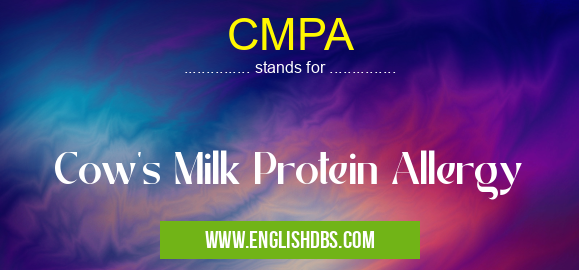What does CMPA mean in HOSPITALS
CMPA stands for Cow's Milk Protein Allergy, a common childhood food allergy characterized by an adverse immune reaction to the proteins found in cow's milk.

CMPA meaning in Hospitals in Medical
CMPA mostly used in an acronym Hospitals in Category Medical that means Cow's Milk Protein Allergy
Shorthand: CMPA,
Full Form: Cow's Milk Protein Allergy
For more information of "Cow's Milk Protein Allergy", see the section below.
Symptoms of CMPA
- Gastrointestinal: Vomiting, diarrhea, abdominal pain, constipation
- Skin: Eczema, hives, rashes
- Respiratory: Asthma, wheezing, nasal congestion
- Systemic: Anaphylaxis (a severe allergic reaction)
Diagnosis of CMPA
CMPA is diagnosed through a combination of:
- Medical history: Symptoms, timing of reactions after milk consumption
- Skin prick test: A small amount of cow's milk protein is placed on the skin to test for an allergic reaction
- Blood test: Detects antibodies against cow's milk proteins
Management of CMPA
The primary treatment for CMPA is complete avoidance of all food sources containing cow's milk protein. This includes:
- Milk
- Cheese
- Yogurt
- Butter
- Ice cream
- Many processed foods
Alternatives to cow's milk include:
- Plant-based milk: Almond milk, soy milk, oat milk
- Hydrolyzed formula: Cow's milk protein broken down into smaller pieces
- Elemental formula: All protein sources removed
Essential Questions and Answers on Cow's Milk Protein Allergy in "MEDICAL»HOSP"
What is Cow's Milk Protein Allergy (CMPA)?
CMPA is a common food allergy that occurs when the body's immune system reacts to proteins found in cow's milk. This can cause a range of symptoms, from mild digestive issues to more severe reactions.
What are the symptoms of CMPA?
Symptoms of CMPA can vary depending on the individual, but may include:
- Skin rashes and eczema
- Digestive issues such as colic, diarrhea, and vomiting
- Respiratory problems such as wheezing and coughing
- Anaphylaxis, a severe allergic reaction that requires immediate medical attention.
How is CMPA diagnosed?
CMPA is typically diagnosed through a combination of a medical history, physical examination, and elimination diet. The elimination diet involves removing all cow's milk products from the diet for a period of time and then reintroducing them to see if symptoms occur.
How is CMPA treated?
The main treatment for CMPA is to avoid all cow's milk products. This includes milk, cheese, yogurt, and any other products that contain cow's milk proteins. In some cases, medication may be prescribed to manage symptoms.
How common is CMPA?
CMPA is one of the most common food allergies in infants and toddlers, affecting up to 3% of children. It is typically outgrown by the age of 3-5 years.
What are the long-term effects of CMPA?
Most children with CMPA outgrow the allergy and have no long-term effects. However, in some cases, CMPA can lead to the development of other food allergies or atopic conditions such as eczema and asthma.
Final Words: CMPA is a serious food allergy that requires careful management. By avoiding all sources of cow's milk protein, individuals with CMPA can effectively prevent allergic reactions and live healthy lives.
CMPA also stands for: |
|
| All stands for CMPA |
